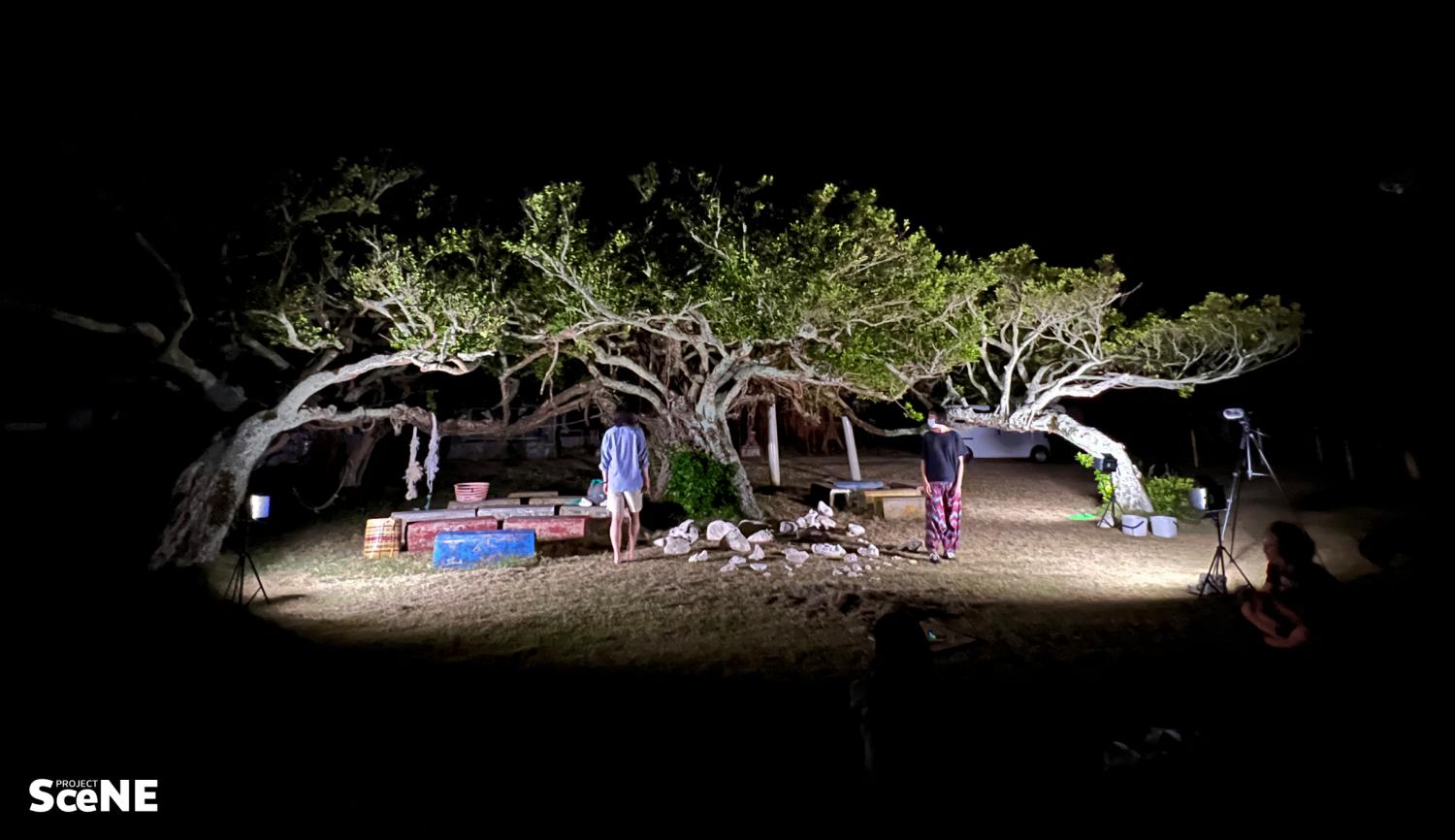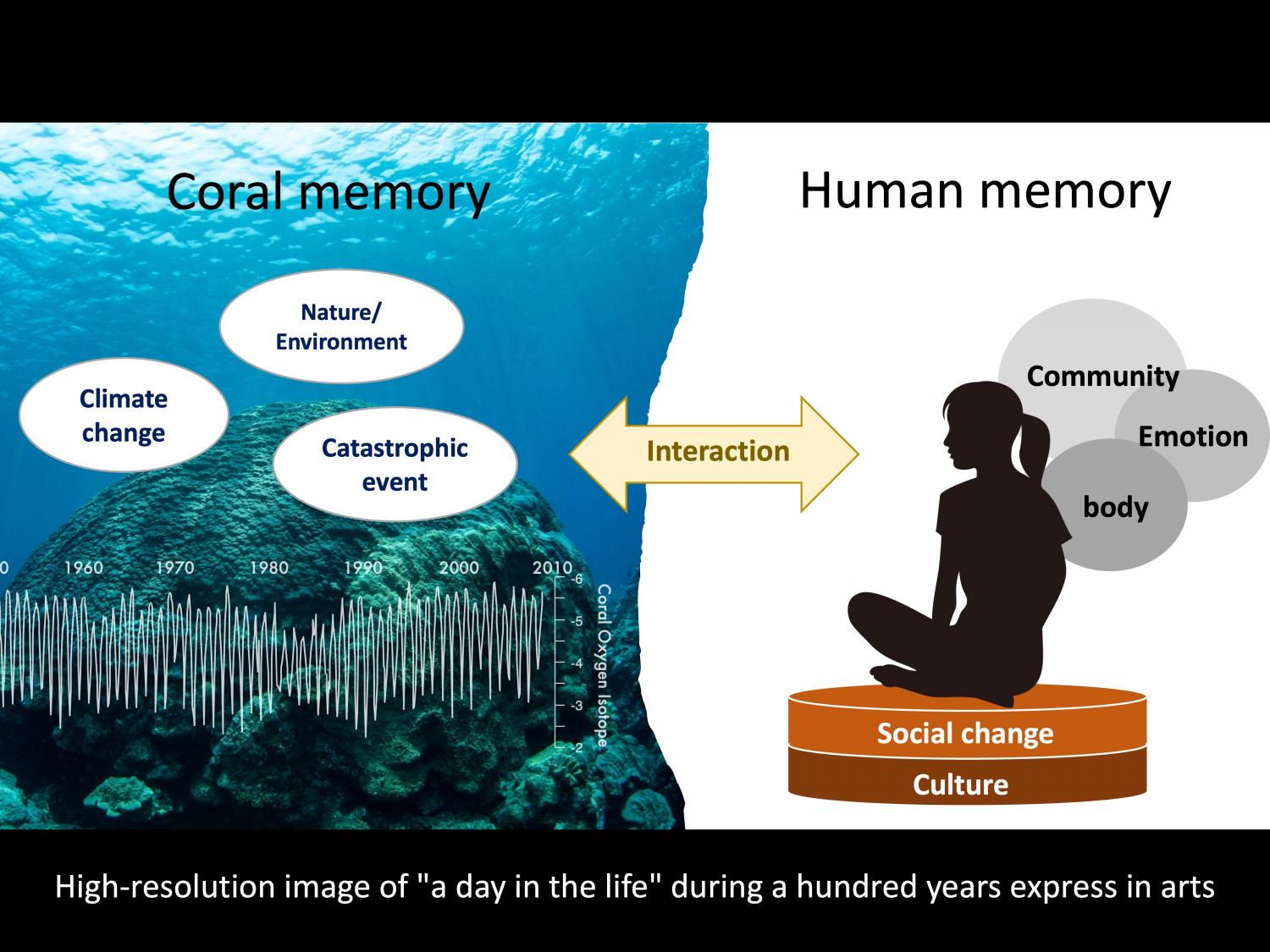
Research Program
Global Environmental Culture Program
SceNE Project
- Related links
High-resolution Reconstruction of Resilient Indigenous Lifestyle in Environmental Changes to Future Collective Knowledge Deduced from the Fusion of Science and Arts
Abstract
How can we make global environmental issues our own? By using high-resolution environmental reconstruction using coral annual bands, this project will discover local indigenous knowledge born from the relationship between humans and nature, and local issues buried in global-scale changes. Using art as a medium, we will discuss how local communities can work toward spontaneous solutions to global environmental problems, and create future collective knowledge to obtain an image of local communities that can easily be empathized with.
Climate change has profoundly affected terrestrial and marine ecosystems, human migration, settlements, lifestyles, and civilizations. Recent economic development, population growth, and globalization risk societal vulnerability, perhaps leading to simpler lifestyles. This project aims to re-evaluate indigenous knowledge from nature and human memories and create a future collective knowledge that is resilient and sympathetic to future global environmental changes.
 Figure 1. An example of the high-resolution images that we aim to achieve in this research, by transforming coral and human memories into art.
Figure 1. An example of the high-resolution images that we aim to achieve in this research, by transforming coral and human memories into art.
 Photo 1. Underwater drilling of reef coral cores. Geochemical analysis of columnar samples can reconstruct hundreds of years of past marine environments on a weekly to monthly resolution.
Photo 1. Underwater drilling of reef coral cores. Geochemical analysis of columnar samples can reconstruct hundreds of years of past marine environments on a weekly to monthly resolution.
Results
What we know so far
In this research, we incorporate artistic methods, including theater, to develop and implement methods aimed at promoting empathy acquisition and collaborative future-thinking among interdisciplinary researchers, local stakeholders, and different generations. In previous studies, we have set virtual SceNEs (Scenes of the Era) in the model region of Kikaijima, where pivotal points of environmental and social change in the past were depicted on theater stages. This allowed for the sharing of high-resolution images of the relationship between people and the environment under different historical periods and environmental conditions. Furthermore, to integrate science and art, researchers and artists are engaging in discussions on how to express scientific concepts through art in a collaborative and equitable manner.
Noteworthy items
During the PR period, we conducted a process of deriving the necessary conditions for integrating science and art. Researchers and artists conducted retreats together, sharing living spaces and engaging in numerous sessions where scientists shared scientific concepts that artists (directors) translated into physical expressions. This process brought researchers and artists closer to a point where the boundary between them became blurred. Furthermore, instead of researchers and artists leading the transformation of the community in the project, we implemented the creation of a new festival as a mechanism for equal information exchange and dialogue between researchers, artists, and local residents, mediated by art.
 Photo 3. SceNERUIM –Dome for experience of “Umwelt”–
Photo 3. SceNERUIM –Dome for experience of “Umwelt”–
News
-
{{ data.disp_date }}
{{ data.content }}
Member
Project Leader
WATANABE Tsuyoshi
Associate Professor, RIHN / Faculty of Science, Hokkaido University
Sub Leader
YAMAZAKI Atsuko (Nagoya University)
Main Members
GOTO Akira (Nanzan University)
KATO Hirofumi (Hokkaido University)
HIRATA Oriza (Professional College of Arts and Tourism)
YAMANO Hiroya (The University of Tokyo)
NAKAMURA Takashi (Tokyo Institute of Technology)
TANAKA Kentaro (Tokyo City University)
NISHIMURA Yuya (Osaka University)
ITO Takeshi (Osaka University)
YODA Mami (Sagami Women’s University)
KATO Katsumi (JTB Corporation)
FUJIEDA Mamoru (Kyushu University)
HASEGAWA Yuko (Kyoto University)
YAMASHITA Megumi (Artist)
MIYAZAKI Rena (Artist)
SAWA Noriyuki (Artist)
UCHIYAMA Ryohei (RIHN)
SHIGESADA Nako (RIHN)
TANAKA Moena (RIHN)
MIYAJI Kohei (RIHN)
Evaluation by an external evaluation committee
Research schedule
| 2020 | 2021 | 2022 | 2023 | 2024 | 2025 | 2026 | 2027 | 2028 |
|---|---|---|---|---|---|---|---|---|
| IS | FS | FS | FS/PR | FR1 | FR2 | FR3 | FR4 | FR5 |
.jpg)